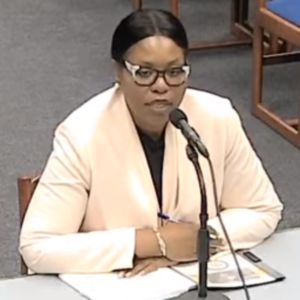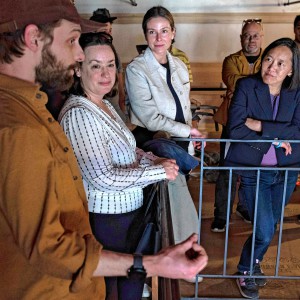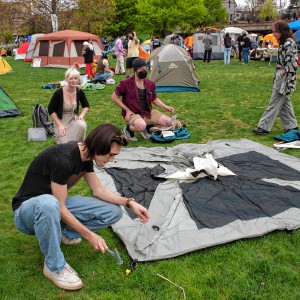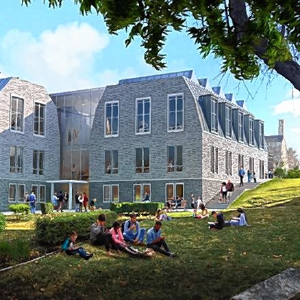Guest columnist Anika Lopes: Inclusion crucial in solving Amherst’s housing woes

Kaboompics.com
| Published: 11-01-2023 4:55 PM |
After two years on the Town Council and weeks of canvassing downtown, I’ve decided to pen a love letter to Amherst. I grew up on Amity Street, spending my formative years navigating the neighborhood on my way to school, visiting friends, and seeing my grandfather, Dudley Bridges, at work at UMass.
It was a neighborhood that was economically diverse, housing professors, custodians, store owners, and students. The conversations during my recent canvassing downtown not only brought back cherished memories but also created new ones. They highlighted a shared desire for a more diverse and inclusive community that welcomes young families, supports first-time homeowners, and offers housing options for retirees who want to downsize while staying in the community.
Amherst has transformed over the last few years, as noted by my fellow District 4 incumbents running for reelection, Pam Rooney and Jennifer Taub [“Amherst must seek housing balance,” Oct. 28]. However, I disagree that “the only constituency that has a stake in maintaining a robust year-round population is us — the year-round residents of Amherst.”
I believe all members of the Amherst community have a stake in the success of our town and that our future cannot be built on claims that suggest that one group knows best or cares more than another. The challenges we are facing are decades in the making and will take all of us working together, as well as a commitment to inclusive planning.
It is important to remember that downtown Amherst has a history of exclusion based on race, immigration status, and religion. My own family’s history here reflects this, with my grandfather, Dudley Bridges, being the first Black homeowner on Amity Street and relatives on McClellan Street running a boarding house that welcomed Irish immigrants and Black Southerners during the Great Migration when housing was scarce based on identity.
Exclusionary zoning and race-restricted deeds have been a part of our town’s history, as documented in the recent African Heritage Reparation Assembly report. These practices have limited families, including my own, from accumulating and passing down generational wealth. To truly become a “town in balance,” we must embrace inclusivity and abandon exclusion based on age, socioeconomic status, or identity.
The changes in our town are connected to various factors, including the increasing number of rental properties marketed to students seeking off-campus living. However, the housing challenges are multifaceted. Rising interest rates, low housing stock, high construction costs and demographic shifts, including an aging population, contribute to a regional housing crisis that’s been well documented by the Donahue Institute. For far too long, we have struggled to develop policies that encourage homeownership, keep seniors in their homes, and create affordable housing for working and middle-class families.
Our town must prioritize policies that support families with school-age children, keep homes owner-occupied, and ensure rental properties are regulated and safe, regardless of the renters’ ages or relationship to UMass. We also need to come to terms with the fact that the growth of UMass over the last 50 years has outpaced the production of housing for faculty, staff and students, creating a perfect, almost recession-proof, investment opportunity for landlords.
Article continues after...
Yesterday's Most Read Articles
 A Waterfront revival: Two years after buying closed tavern, Holyoke couple set to open new event venue
A Waterfront revival: Two years after buying closed tavern, Holyoke couple set to open new event venue
 Island superintendent picked to lead Amherst-Pelham region schools
Island superintendent picked to lead Amherst-Pelham region schools
 Music key to Northampton’s downtown revival: State’s top economic development leader tours city
Music key to Northampton’s downtown revival: State’s top economic development leader tours city
 Pro-Palestinian encampment disperses at UMass, but protests continue
Pro-Palestinian encampment disperses at UMass, but protests continue
 Area property deed transfers, May 2
Area property deed transfers, May 2
 Amherst council hears call to scale back Jones work
Amherst council hears call to scale back Jones work
Furthermore, we need to understand the limits of what we can do given the lack of available land to build new homes since much of it has been set aside for conservation. Striving to strike a balance between students and year-round residents does not address the root causes of the town’s housing woes and it ignores the fact that higher education is the largest driver within the town’s economy.
The pandemic made it clear that the fate of the town and our higher education institutions are inexorably linked. The problem of housing is decades in the making and will take hard work, collaboration, and inclusion to find solutions that will begin to address the crisis.
As a renter myself, I want to own a home in Amherst, a place my family has called home since before the town was named Amherst. My ancestors worked at both UMass and Amherst College, built homes on Hazel Avenue, ran successful businesses, and laid the jazz roots of our town.
I am committed to promoting policies that ensure safe, affordable, and attainable housing for all community members. However, I will not support policies that replicate past injustices and jeopardize our town’s future. I advocate for more housing throughout Amherst, especially in village centers with reliable access to public transportation.
I empathize with my neighbors’ frustrations and fears, having recently chased down students who stole campaign signs for the second time in a month. It’s easy to blame students for our housing issues, but they represent the best hope for our community’s future. We need young people to love Amherst, as I do, so they’ll return to build families here.
The future of Amherst hinges on a Town Council that is curious and dedicated to addressing the challenges ahead, including affordable housing, economic development, environmental sustainability, and racial equity.
I love this town, and I know that we can come together to build a welcoming and inclusive Amherst.
Anika Lopes is an Amherst town councilor and founder of the Ancestral Bridges Foundation.

 Guest columnist Gene Stamell: We know what we know
Guest columnist Gene Stamell: We know what we know Jennifer Dieringer: Budget must serve whole city
Jennifer Dieringer: Budget must serve whole city Ken Rosenthal: Time to change direction on Jones Library
Ken Rosenthal: Time to change direction on Jones Library Sage Cooper-Clermont: A well-deserved thank you for chain of help
Sage Cooper-Clermont: A well-deserved thank you for chain of help
